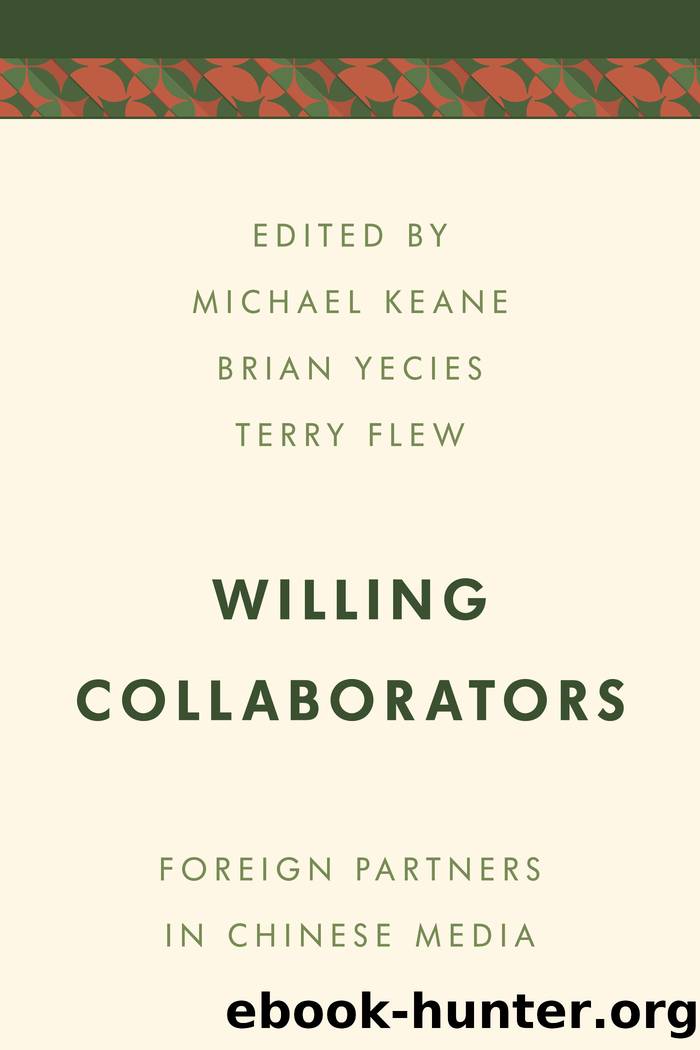Willing Collaborators by Keane Michael;Yecies Brian;Flew Terry;

Author:Keane, Michael;Yecies, Brian;Flew, Terry;
Language: eng
Format: epub
Tags: undefined
Publisher: Rowman & Littlefield Unlimited Model
Published: 2012-08-15T00:00:00+00:00
Conclusion
The cases I have selected in this chapter illustrate the phenomenon of managed and controlled cultural globalization in China. Fanfan Comics constitutes a window for the importation of Japanese comics to China. This âJapan agentâ is of course highly monitored and experimental in nature. This experiment may lead to different results under different circumstances.
The control of media and other cultural content continuously fluctuates along an ideological spectrum of relaxation and constriction. Under the current cultural policy it seems that the pendulum has swung to the stringent end. Until recently, there was still a list of banned Japanese manga. Thus, the strategic outlet for Japanese comic culture could only operate in a piecemeal fashion, and the Chinese regime opened a minuscule outlet for its entry. As illustrated in this chapter, the parameters of cultural entry are easily identifiable, adjustable, and flexible, thus leaving room for increase in the cultural influx. When the Sino-Japanese relationship changes, or when other favorable factors emerge, the experimental project may influence not only comic sales in China but also the importation of Japanese manga and their derivative forms, such as games and movies, which could be expanded and reproduced in new formats. Because this strategized importation serves as a model of the global cultural industry, it enhances and boosts Chinaâs own cultural industry. In theoretical terms, it is a kind of controlled globalization instead of the free flow of culture globally, which is the dominant model enforced by the global world power headed by the United States. In other words, as another rising global power, China has legitimized alternative models of globalization: controlled globalization, managed globalization, and bilateral globalization. It is also likely that when China and other global powers emerge to challenge the dominant powers other models of cultural flow will take place. To understand and describe these diverse models is to challenge the Western thesis and perspective of globalization, which perhaps comprises a discourse that camouflages cultural imperialism.
The realpolitik of the PRC in tackling cultural industries and cultural globalization also raises new facts about globalization. Based on Held et al.âs[23] classification, China and other Third World countries could be referred to as âglobal skepticsâ in that they are critical of the value of globalization and argue that globalization is simply a disguised strategy for the expansion of neo-liberalism. However, the case study conducted in this chapter impugns this claim. It also reveals the hidden belief of China. Hence, China might not be different from other âhyper-globalizersâ because the globalization strategized by the Chinese authorities is meant to benefit Chinaâs cultural industry in many ways. In other words, it suggests that even China might also believe that despite its potentially negative consequencesâthat is, ideology embedded in cultural products might contradict that promulgated by the stateâglobalization can also be conducive to the goals of the state. The circulation of ideology embedded in cultural products contradicts that of the state.
Hence, Chinaâs behavior is similar to the third category suggested by Held et al., that of a âcultural transformer,â which proposes that there might be different outcomes of globalization.
Download
This site does not store any files on its server. We only index and link to content provided by other sites. Please contact the content providers to delete copyright contents if any and email us, we'll remove relevant links or contents immediately.
Cecilia; Or, Memoirs of an Heiress — Volume 1 by Fanny Burney(32558)
The Great Music City by Andrea Baker(32019)
Cecilia; Or, Memoirs of an Heiress — Volume 2 by Fanny Burney(31956)
Cecilia; Or, Memoirs of an Heiress — Volume 3 by Fanny Burney(31942)
We're Going to Need More Wine by Gabrielle Union(19046)
All the Missing Girls by Megan Miranda(16028)
Pimp by Iceberg Slim(14508)
For the Love of Europe by Rick Steves(14121)
Bombshells: Glamour Girls of a Lifetime by Sullivan Steve(14075)
Talking to Strangers by Malcolm Gladwell(13370)
Norse Mythology by Gaiman Neil(13365)
Fifty Shades Freed by E L James(13241)
Mindhunter: Inside the FBI's Elite Serial Crime Unit by John E. Douglas & Mark Olshaker(9343)
Crazy Rich Asians by Kevin Kwan(9292)
The Lost Art of Listening by Michael P. Nichols(7506)
Enlightenment Now: The Case for Reason, Science, Humanism, and Progress by Steven Pinker(7313)
The Four Agreements by Don Miguel Ruiz(6765)
Bad Blood by John Carreyrou(6621)
Weapons of Math Destruction by Cathy O'Neil(6280)
